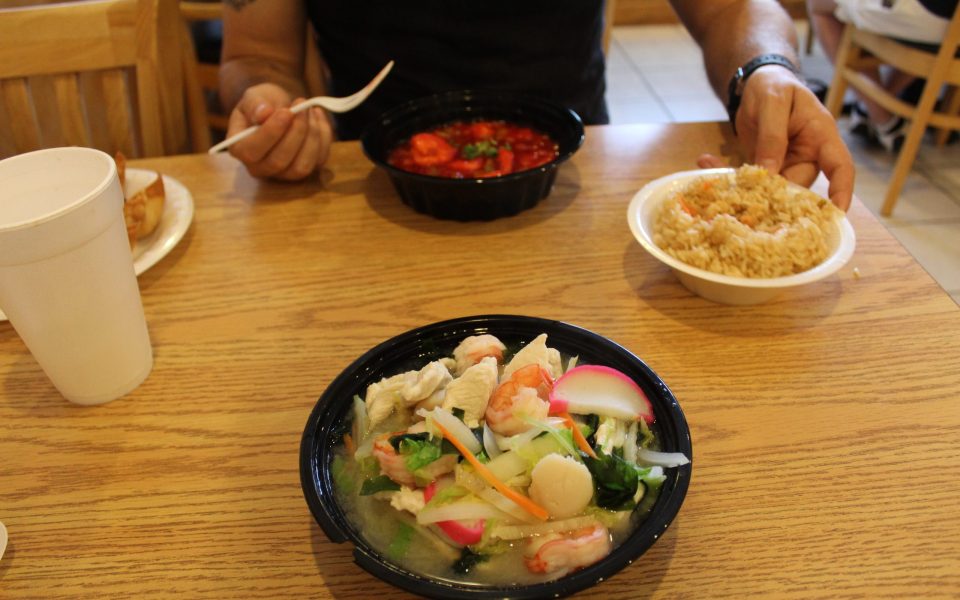You’re reading this, presumably, because you love food. Maybe you don’t like the term foodie — I for one think it’s a little pretentious and sounds stupid anyway — but you must be at least marginally interested in learning about places to find delicious food you haven’t tried yet, or you care at least a little about understanding food culture. Or perhaps you’re just here because you’re bored, and couldn’t think of a better way to —in the immortal words of the Spice Girls — “spice up your life” for the next 10 minutes.
If you care even passingly about food, you need to care about immigrants and refugees, and what happens to them.
Here we go, you’re thinking, a lecture from a do-gooder liberal. I’ll pass.
But you actually need to read this if you’re going to read anything else about food. It affects you, as a human who consumes food products, and so you might as well know about it.
First, the obvious: Immigrants probably grew and picked your food. If you eat in a restaurant, chances are high that immigrants are working in the kitchen, and maybe cleaning up after you as well. If you’re going to restaurants I recommend in this space, immigrants often own the restaurant, too. To eat, we all depend on immigrant labor.
Some of you will quickly point out that I’m conflating undocumented immigrants with documented, lawful ones. Such a distinction isn’t as clean as it might seem. For starters, individuals’ immigration status often isn’t a fixed thing (stories of people being stranded by their changing status are easy to find, including on our website). Companies also frequently bring people into the United States on temporary work visas, whether it’s to harvest mushrooms or tobacco. Within a given family, you’re likely to find a wide range of legal statuses. Stories of undocumented immigrants whose kids are US citizens (or who have other legal status such as Deferred Action for Childhood Arrivals) abound.
If you care even remotely about the people who grow, pick, transport, wash, prep, cook or serve your food, you have to acknowledge that either they or their family members lack legal status to remain in the country. You have to admit and accept the price that deporting undocumented immigrants — in addition to likely driving up the price of food in groceries and restaurants due to increased labor costs — would have on millions of documented, legal immigrants.
Less importantly, though it may affect you more directly, it would mean the decimation of vibrant and diverse food cultures right here.
Some of you are unconvinced, and will argue that undocumented immigrants broke a law that should be enforced. But law enforcement has limited resources, so what you’re really arguing isn’t just that people should be held responsible, but that this should be a priority. Crime rates — regardless of the White House’s planned list — do not bear out this logic.
Maybe you’re still unconvinced, and argue that undocumented immigrants are “cutting in line.” There’s plenty wrong with this argument, but let me raise something specific for you to consider.
You know how Donald Trump rails against NAFTA, the North American Free Trade Agreement? The 1994 deal didn’t work for most of us — it made it easier for companies to move jobs abroad and then ship their sweatshop goods back here, for example.
But it also didn’t work well for many Mexicans. NAFTA made it easier for US companies to import their foodstuffs to Mexico, and US corn flooded the market. Our government subsidized this corn production, which meant that it could be sold in Mexico for less than the cost of production. This screwed countless Mexican farmers — their society had remained more agrarian than ours — and people started leaving their land. Mexicans — who’d been known as “the people of the corn” — crowded into their nation’s cities and then many of them, unable to find work, headed north.
You can blame Bill Clinton for signing NAFTA or agribusiness for exploiting it, but one thing is clear; the people at the bottom — the everyday Mexican farming family — didn’t ask for this, and they’re victims here. You can aggrandize Trump for his stance on the Trans-Pacific Partnership if you want, arguing that it would’ve been a similarly damaging deal, but don’t fall prey to his scapegoating and fear-mongering.
NAFTA is just one example of why people immigrate to the United States; I could regale you with stories of how the Reagan administration backed an oppressive military regime in El Salvador or funded Contra terrorists in Nicaragua, and we could explore the role former Secretary of State Hillary Clinton played in legitimizing a coup in Honduras, too. But here’s my point: Many immigrants come to the United States because they are fleeing terrible conditions in their countries, conditions that our government frequently played a major role in creating.
That means it’s partially our fault.
The same is true for refugees, in many cases. Immigrants and refugees are often conflated — they are different legal classifications, and who gets to be considered a refugee is sometimes politically motivated, but you can read more about that elsewhere — but one distinction that’s crucial is that all refugees are documented and carefully screened.
Don’t fall victim to hysteria. The Trump regime wants to create a ban on people coming from several African and Middle Eastern nations, while noticeably leaving out neighboring countries where Trump has business ties, as Bloomberg reported. Saudi Arabia isn’t on the list, the country where most of the 9/11 attackers came from. Iraq is, and I don’t need to tell you how our government destabilized that country or killed an obscene number of innocent people there.
If you sit and talk with the people who work in our local restaurants, you’ll eventually hear stories about what some of them were escaping. Maybe you’ll talk to the Iraqi man I know who works in a Greensboro kitchen, or the Congolese woman who grew your food. Maybe you’ll meet the charismatic Salvadoran woman who owns the restaurant you’re sitting in, or realize that your mayor is the descendant of Syrian immigrants, or realize that the Mexican kids playing in the corner of their parents’ tienda wouldn’t have anyone to look after them if the undocumented adults in their life were deported.
Our immigration system is broken, that’s for certain. I can relate to the fear you might be feeling — the Boston Marathon bombing happened almost directly in front of my parents’ old apartment, and I feared for them for the following tense days. But don’t be a rube; look at the facts, and realize that the fear you might feel (especially if you’re white and aren’t Muslim!) is likely a fraction of what your immigrant and refugee neighbors are feeling right now. Extend a little compassion.
If you don’t care about them, about the Syrian refugees who’ve been resettled in our community or about the immigrants who almost certainly made your next meal possible, then you’re not a real foodie. If you’re just here for the food and you don’t care about the back story, about the people and labor and systems behind it, you better start growing all your own food and stop eating out.
Oh and by the way, Mexico is the largest supplier of fruits and vegetables to the United States, according to the Washington Post, so if you care about either — or tequila — that whole import tax idea is a no-go. You want your avocado toast? Better fight for it.
Join the First Amendment Society, a membership that goes directly to funding TCB‘s newsroom.
We believe that reporting can save the world.
The TCB First Amendment Society recognizes the vital role of a free, unfettered press with a bundling of local experiences designed to build community, and unique engagements with our newsroom that will help you understand, and shape, local journalism’s critical role in uplifting the people in our cities.
All revenue goes directly into the newsroom as reporters’ salaries and freelance commissions.





Leave a Reply